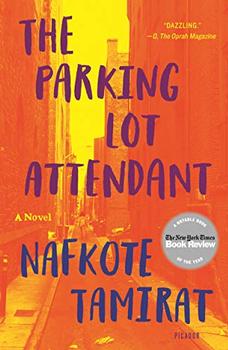Book Club Discussion Questions
In a book club? Subscribe to our Book Club Newsletter!
Please be aware that this discussion guide will contain spoilers!
A haunting story of fatherhood, national identity, and what it means to be an immigrant in America today, Nafkote Tamirat's The Parking Lot Attendant explores how who we love, the choices we make, and the places we're from combine to make us who we are. The story begins on an undisclosed island where the unnamed narrator and her father are the two newest and least liked members of a commune that has taken up residence there. Though the commune was built on utopian principles, it quickly becomes clear that life here is not as harmonious as the founders intended. After immersing us in life on the island, our young heroine takes us back to Boston to recount the events that brought her here. Though she and her father belong to a wide Ethiopian network in the city, they mostly keep to themselves, which is how her father prefers it.
This detached existence only makes Ayale's arrival on the scene more intoxicating. The unofficial king of Boston's Ethiopian community, Ayale is a born hustler—when he turns his attention to the narrator, she feels seen for the first time. Ostensibly a parking lot attendant, Ayale soon proves to have other projects in the works, which the narrator becomes more and more entangled in to her father's growing dismay. By the time the scope of Ayale's schemes—and their repercussions—become apparent, our narrator has unwittingly become complicit in something much bigger and darker than she ever imagined.
Discussion Questions for The Parking Lot Attendant
- The protagonist remains nameless throughout the novel, despite the fact that she's told she has "an important name." Consider how this choice impacted how you related to the narrator. Why might the author have decided not to assign a name to the central character?
- Early in the novel, the narrator notes: "Since meeting Ayale, I, too, have used Ethiopia and my Ethiopianness to measure my worth, to feel that I had proof of being different from or better than others." How do you interpret this statement? What examples do you see of the protagonist using her Ethiopian identity in this manner?
- Reflecting on Ayale, the narrator notes: "Sometimes, however, the best people are the worst for us to love." How do you see this notion play out in the relationship between the protagonist and Ayale? How about with her parents?
- When the narrator enquires about the truth of Ayale's parking lot scheme, he responds: "'I don't see myself as someone who will have children. I think you have to be a kind of person that I'm not. I'm glad that you happened onto the lot, I'm glad that you've stayed, and I have no one else of my own to tell. I guess you could say I'm bequeathing this to you; it's my only fortune." After finishing the novel, to what extent do you think Ayale's statements are genuine? What elements seem crafted for manipulative purposes?
- There is much dialogue in the novel, yet the speakers are never named. In what ways did this aesthetic choice impact your reading of the story? Why might the author have chosen not to identify the speakers?
- The narrator laments: "Whenever a teacher first heard my name and feigned curiosity as to its origins, starting or ending with an insincere 'It's so pretty!' I wanted to protest, I'm American! What's an Ethiopia? How does one come to be there? How does one come to leave it to go an America? But in truth, I was only almost American, so I gave my explanations and nothing else of myself until the bell rang." How would you interpret the narrator's conceptions of her identity? In what ways does the parking lot help her reframe this sense of identity?
- Ayale makes the following statement on pg. 135: "America gave me a job, which means it gave me a name—the attendant—and an identity—the man who parks cars—and a purpose—to park as many cars as possible." Unpack the relationships among nation, work, and identity in the novel.
- Ayale originally envisions the new country as: "A nation with cultural authenticity from Ethiopia and the latest technology, medicine, and entertainment from America. First and third worlds coming together in a marriage of equals." In what ways does the Danga's implementation of the society adhere to this mission? How does it stray?
- The narrator's opinions of her parents shift quite a bit throughout. In the end, how would assess their parenting? In what ways do they fail their daughter? In what ways do they support her?
- Toward the end of the novel, the protagonist wonders: "Did I do more harm than good those years?" Ultimately, do you think the narrator is culpable in any way for the crimes that Ayale orchestrates? Why or why not?
- Trace the concept of loyalty throughout the novel. In what ways do loyalty and power interact? How does the narrator's perception of loyalty shift over time?
Unless otherwise stated, this discussion guide is reprinted with the permission of Picador.
Any page references refer to a USA edition of the book, usually the trade paperback version, and may vary in other editions.
